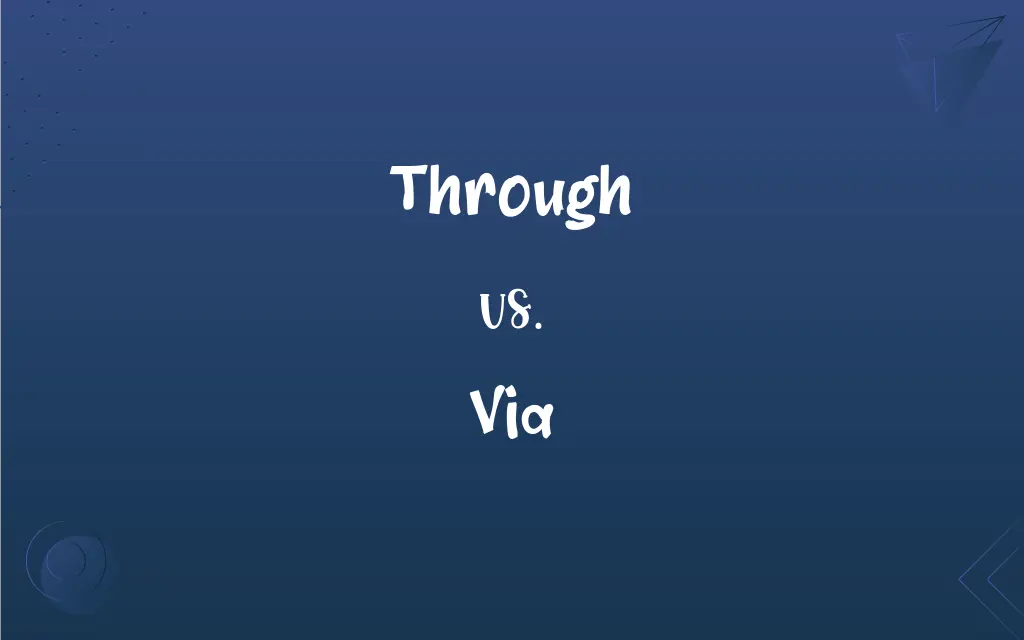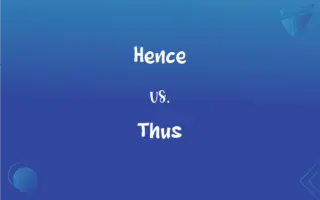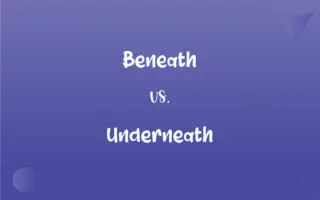Through vs. Via: What's the Difference?
Edited by Aimie Carlson || By Janet White || Published on November 28, 2023
"Through" implies a direct path or movement inside something from one end to the other, while "via" means by way of or through the medium of.

Key Differences
"Through" and "via" are both prepositions used to describe movement or means, but they have different connotations and uses. "Through" often implies movement from one end to another within something, suggesting a direct path or progression. For instance, "He walked through the forest" indicates a passage directly across the forest. "Via," on the other hand, refers to a route or a means of getting to a place or achieving something, often implying a medium or an intermediary. For example, "She sent the document via email" suggests that the email was a medium for sending the document.
In terms of travel or transportation, "through" can suggest a journey across or within a place without stopping, as in "The train passed through the city." "Via" often specifies the route or method used in the journey, as in "They traveled to Rome via Frankfurt," which indicates that Frankfurt was a stop or route on the way to Rome.
"Through" can also imply completion, as in finishing or getting to the end of something, such as "He read through the report." "Via" does not have this connotation; instead, it focuses on the means or process used, not on completion, like "She learned Spanish via an online course," where the emphasis is on the method used for learning.
"Through" is also used to express time, indicating duration from start to finish, as in "The shop is open Monday through Friday." "Via" is not typically used in this context; it is more concerned with specifying a route, channel, or method rather than a duration.
In a metaphorical sense, "through" can mean experiencing or enduring something, such as "He went through a lot of challenges." "Via" lacks this metaphorical use and is more literal, indicating a medium or pathway, like "The news spread via social media."
ADVERTISEMENT
Comparison Chart
Definition
A direct path or movement inside something
By way of or through a medium
Usage in Travel
Movement across or within, without stopping
Specifies route or method of travel
Connotation
Can imply completion or experience
Focuses on means or process used
Usage in Time
Indicates duration from start to finish
Not typically used for duration
Metaphorical Use
Experiencing or enduring something
Lacks metaphorical use, more literal
ADVERTISEMENT
Through and Via Definitions
Through
Continuing in time towards completion of a process or period.
She worked through the night.
Via
By way of; through the agency or medium of.
They flew to London via Paris.
Through
By means of; by the agency of.
The bill was passed through the efforts of many.
Via
By means of a particular person, system, or process.
She communicated her decision via email.
Through
Directly; entering and then leaving.
The road goes through the forest.
Via
Using a particular machine, system, or person.
He paid for the purchase via credit card.
Through
From one end or side of something to the other.
He walked through the tunnel.
Via
Traveling through a place en route to another.
The shipment was sent to Australia via Singapore.
Through
From beginning to end; completely.
He read the book through in one sitting.
Via
By the route which includes the named place.
The flight route is from New York to Tokyo via Los Angeles.
Through
In one side and out the opposite or another side of
Went through the tunnel.
Via
By way of
Went to Pittsburgh via Philadelphia.
Through
Among or between; in the midst of
A walk through the flowers.
Via
By means of
Sent the letter via airmail.
FAQs
What does "through" mean in terms of movement?
"Through" means moving from one end to the other inside something.
What does "via" indicate in travel?
"Via" indicates the route or method used in travel.
Can "via" be used for electronic communication?
Yes, "via" is often used to describe the medium of electronic communication.
Does "through" imply a direct path?
Yes, "through" often implies a direct or uninterrupted path.
Is "via" used in the context of time?
No, "via" is not typically used to describe time.
Can "through" be used to describe time?
Yes, "through" can describe duration from start to finish.
Is "through" used metaphorically?
Yes, "through" can be used metaphorically to mean experiencing something.
What is an example of "via" in transportation?
"The goods were shipped to Europe via the Atlantic Ocean."
Can "through" be used for processes?
Yes, "through" can describe going from start to finish in a process.
Is "via" formal or informal?
"Via" is often considered more formal, especially in written communication.
Can "through" mean 'by means of'?
Yes, "through" can mean 'by means of' or 'by the agency of'.
Can "via" indicate the medium of communication?
Yes, "via" is commonly used to indicate the medium of communication.
Can "via" be used to describe indirect routes?
Yes, "via" can describe routes that are not direct.
Is "through" used in spatial contexts?
Yes, "through" is frequently used to describe spatial movement.
Does "through" imply completion?
Yes, "through" can imply completing or going through something entirely.
Is "via" used in legal or formal documents?
Yes, "via" is often used in legal or formal contexts.
Does "via" imply a stopover in travel?
"Via" can imply a stopover or a specific route in travel.
Does "through" have different meanings in different contexts?
Yes, "through" can have various meanings depending on the context.
Is "via" limited to physical travel?
No, "via" is used for both physical travel and other means like digital communication.
Can "through" be used in the context of a medium?
Yes, but less commonly than "via."
About Author
Written by
Janet WhiteJanet White has been an esteemed writer and blogger for Difference Wiki. Holding a Master's degree in Science and Medical Journalism from the prestigious Boston University, she has consistently demonstrated her expertise and passion for her field. When she's not immersed in her work, Janet relishes her time exercising, delving into a good book, and cherishing moments with friends and family.
Edited by
Aimie CarlsonAimie Carlson, holding a master's degree in English literature, is a fervent English language enthusiast. She lends her writing talents to Difference Wiki, a prominent website that specializes in comparisons, offering readers insightful analyses that both captivate and inform.







































































